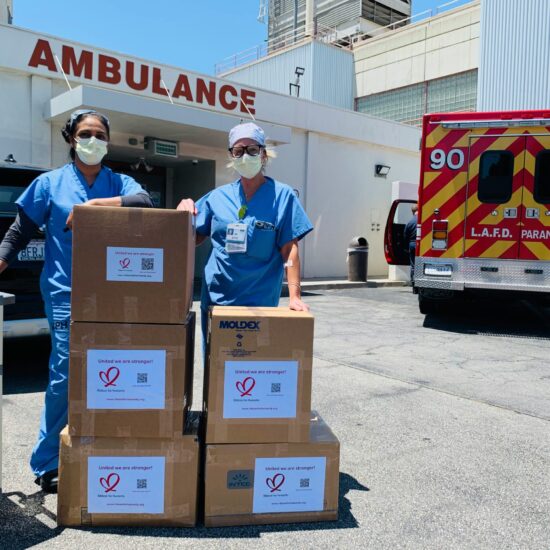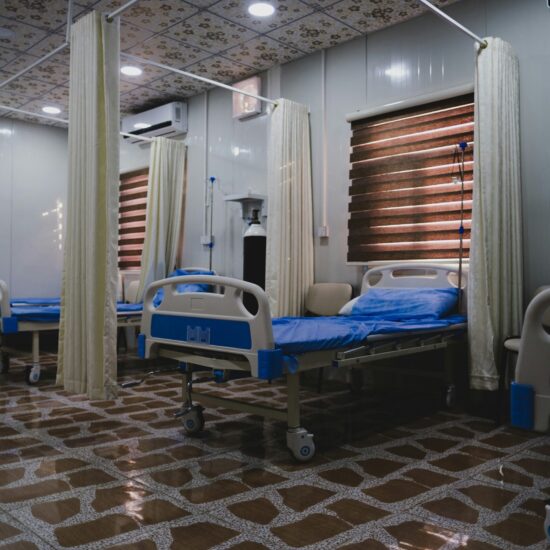“I’m just the nurse.” I blurted it out during a role-play at the start of nursing school. “Never say that,” my instructor corrected, “there is no such thing as ‘just a nurse.’” She’s right, but even though nurses are named the “most trusted profession” year after year in Gallup polls, and even though our importance to quality care is well documented, our value is often under-recognized in the health care system as a whole. H.R. 379, the National Nurse Act of 2015, could help change that.
This bill, introduced by Representatives Eddie Bernice Johnson (D-TX) and Peter King (R-NY), takes the existing position of “Chief Nursing Officer” and essentially transforms it into the “National Nurse for Public Health.” The bill is nonpartisan and revenue neutral. I, along with other nurses, recently lobbied members of Congress to support the “National Nurse Act” and joined a small but engaged audience at a Congressional briefing for the bill in February.
H.R. 379 advertises itself as an intervention in the epidemic of chronic health conditions Americans suffer from, especially obesity, diabetes and cardiovascular disease. The idea is that having a National Nurse reliably and consistently promote chronic disease management in combination with a wellness-based model of health care could reduce American’s chronic disease burden. Since America now spends 86% of every health care dollar on chronic conditions (according to the CDC), bringing down our spiraling rate of, say, obesity by even a small amount could improve people’s lives and save real money on treatments for high blood pressure, osteoarthritis, coronary artery disease, and even cancer.
That would be undeniably important work, but I believe the National Nurse role has a much larger potential to positively impact public health and that potential is worth outlining here even though it’s not part of the specific mandate of the law. Ideally, the National Nurse would become the go-to source of information and reassurance during more acute public health crises.
Doctors and nurses speak with very different voices and are heard differently by the public. Physicians are diagnosers and prescribers, while nurses are front-line caregivers. We spend more time with patients than any other health care worker and we are trained to serve as intermediaries between the patient and the rest of the health care system. Those yearly Gallup polls show that patients find us very trustworthy in that role—more trustworthy even than MDs.
So imagine that most-trusted nurse’s voice interjected into some of our recent public health crises. When Ebola first came to the U.S. public education about the risks of Ebola was haphazard, the C.D.C. was slow to create adequate protocols for containing the disease, and those policy and communication glitches exacerbated people’s confusion and fear.
A National Nurse could have started an Ebola website that answered, in lay terms, the most pressing public health questions about the disease: When are people contagious? Why would limiting flights out of West Africa make it harder to control the outbreak? How afraid should the average person be? The National Nurse could also have given guidance on infection control for nurses in the entire country and debunked misinformation about Ebola patients in the U.S.
The National Nurse could intervene similarly in our ongoing crisis over parents choosing not to vaccinate their children. There is no evidence that the measles vaccine causes autism, but the perception that it does, or that it causes other medical problems, has been difficult to displace from the public imagination, leading to a growing number of unvaccinated kids and measles outbreaks this winter. MDs confronted with parents who don’t want to vaccinate might come across as biased authorities if they urge vaccination. But I wonder if a nurse’s voice would register more like a concerned friend able to explain in lay terms what the known risks of the vaccine are versus how bad a case of measles can be for a child.
Finally, the National Nurse would complement, not displace the Surgeon General’s work in public health, and thus formalizes our growing national focus on health care being practiced by teams. Because the role of National Nurse gives nursing parity with doctors in the arena of patient education it would be symbolically resonant in terms of modeling truly collaborative health care.
When I went back to school to become a nurse (after three years spent teaching English in college) I quickly learned how important the job of clinical nurse is. Passing H.R. 379 could start a real conversation with the public about improving and maintaining our nation’s health. It would also make clear on a national level that there never has been any such thing as “just a nurse.”
NOTE: The American Nurses Association and a host of other health care organizations support the National Nurse Act of 2015. For more information, go to: http://nationalnurse.org/. Writing your member of Congress in support of the bill is also very helpful.










djmasonrn / March 27, 2015
While this is an attractive idea that the developers have modified to meet specific objections from nurses in the Public Health Service and from some of the national nursing organizations, the concern that remains for some is whether it’s the priority issue for nursing right now. If Congress passes this bill, it could remove pressure from Congress to also act on bills that potentially are much more important to nursing and the public. For example, legislation to remove the requirement that physicians sign referrals for Medicare patients to get home care and hospice has been reintroduced. This is huge, as it’s a major barrier for NPs in states with full practice authority to be able to practice to the full extent of their education and training, It also delays care that patients need, is inefficient, and is costly. The national nurse may be an easy bone for Congress to throw to nursing.
/
Theresa Brown / March 27, 2015
Thanks for the thoughtful comment, Diana. I understand your concern, but look at the situation differently. Installing the National Nurse could raise the profile of nursing nationally, making it more likely that other legislation that supports nursing will also get passed. Creating a greater sense of parity and collegiality between MDs and RNs in this way could make parity and collegiality in other arenas easier to secure. Also, it’s on nursing not to ever become complacent, or say, “We got the National Nurse, we should be happy.” Pushing for real and important change for NPs and patients in signing of Medicare referrals has nothing to do with the National Nurse Act and shouldn’t be considered in lieu of or instead of. Why don’t we try for both? Maybe both will pass. And wouldn’t that be great.
/
June / March 28, 2015
Thanks for your comments. While I am not a nurse, I am a grandmother and I care about the future of this country and healthcare. I think we create a problem in political efforts when we lose sight of the big picture and take a “them and us” mentality. Let’s work together for what is right and helpful, not just for what little we think we can beg from our legislators. They too often forget that they work for us, not the other way around! Let us make sure we don’t forget it too. Let’s stand together for what is healthy and needed, not just for what we can get by compromising, or worse, working against one another. I appreciate your reasonable and positive outlook, Theresa.
/
djmasonrn / March 28, 2015
Theresa, political reality is that legislators would rather take the easy route (the National Nurse would be) and say that they gave nursing something. The Medicare change is huge and could significantly improve the lives of patients in a way that the NN would not. We already have a “chief”, if you will, public health nurse. The NN would give more visibility to that in a good way. It’s not insignificant, but that person will still be tied to the wishes of the administration. What do hear from our current SG, Murthy? In the past, SGs have had their hands tied by presidents and others who really don’t want them to be speaking truth. So I don’t agree that this bill could have more of an impact than the Medicare bill. That said, I’m not opposed to strengthening the NN. I just think all of this effort could be more useful if we got behind the Medicare change.
/
Theresa Brown / March 28, 2015
First, June, a shout-out to you for your optimism–thank you. And, Diana, I didn’t say and certainly didn’t mean to imply that the NN is more significant than the bill to reform Medicare and give NPs the ability to make referrals to hospice care. I think the only thing the two have to do with each other is the ability to create synergy–supporting one, and/or the passage of one could make passage of the other more likely. Your either/or model only applies in a world where we believe nurses have to limit what we expect from our government, and shouldn’t ask for “more” because that risks getting nothing. Instead I say we should ask for more because if you don’t ask, you don’t get. But also, it is impossible to say what this particular congress might or might not do. The biggest accomplishment of the House over the past 4 years is repeatedly repealing Obamacare–a symbolic vote with no legislative value. The NN is non-partisan and in a wholly separate sphere financially and politically from the bill to reform Medicare. How this congress will react to either cannot be predicted with any accuracy.
/
djmasonrn / March 29, 2015
All good points, Theresa.
/
Macia Moody / March 29, 2015
While at first glance this bill may seem to be no more than a “title” change, it is in reality so much more significant. It will give the nurse holding that title ever so much more visability and a platform and forum from which to get across the very important messaging that informs and educates the public about the critical nature of prevention and the importance of wellness. It will give recognition and status to the National Nurse an give him or her a real voice. As a State Representative, I am well aware of just how powerful a thing a single voice can be.
/
Alisa / March 29, 2015
I appreciate the great discussion about this legislation. Indeed there are many important that our Congresswomen and men must consider every year. I believe the message that nurses can’t afford to speak out on issues important to them lest they threaten the movement in Congress of any one “truly important” issue presents far greater consequences for the profession than any one piece of legislation getting chosen over another. As the largest health care workforce in the country there should always be more than 1 or 2 major pieces of legislation in order to impress on Congress the power and force that nursing represents. If only 10% of the nursing workforce were encouraged and supported to speak out to Congress about issues important to them there would be nearly a quarter of a million people wielding the power of their voice and vote. Nursing is also no longer one single profession and members within the profession cannot possibly be represented by one piece of legislation. There should be many bills, so many that Congress cannot help but hear the voices from all of the diverse roles, scopes of practice, and specialties within nursing. So rather than spreading the message that nurses should be quiet, careful, or singularly focused I believe nurses need to be invited to come out in force and put their support behind whatever issues are important to them. I am putting my voice and the power of my vote behind this legislation that calls for the much needed attention to public health nurses’ roles and elevates a current nursing leadership role to greater responsibility for representing nursing at the national level. I am also in support of funding for nursing education and for nurses practicing to the full extent of their scope. By educating my Congressional members about how these issues are all different and important for nursing I help educate them on what nursing really is, in all its diversity.
/
Kathy Mancusi / March 30, 2015
Theresa– I have been a supporter of this law for some time. It speaks for itself. Kathy Mancusi, former nurse, now attorney.
/
Becky Bowers-Lanier / March 30, 2015
Time to pass this bill! We need to have the voice of nursing recognized for our role in public health promotion and disease prevention!
/